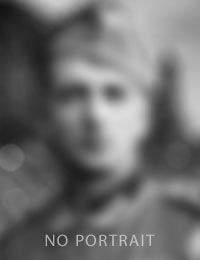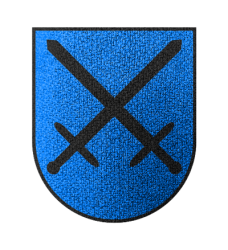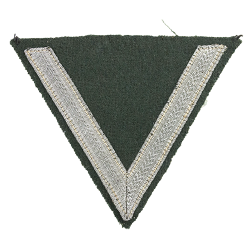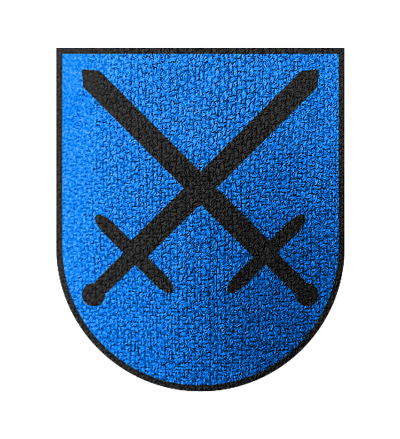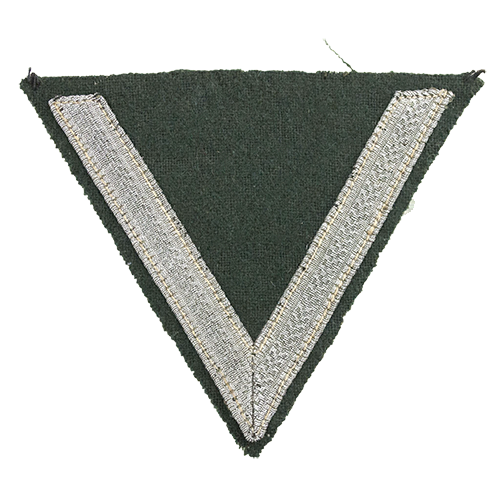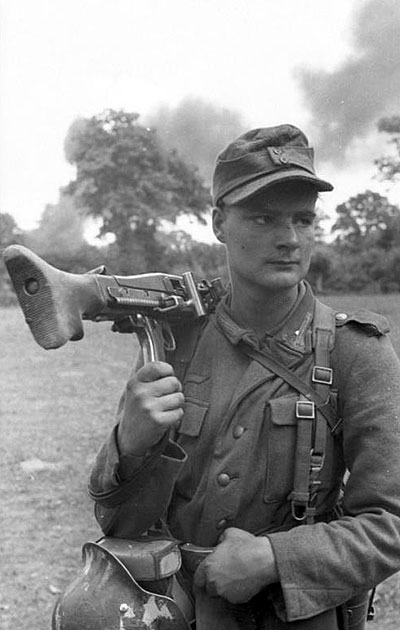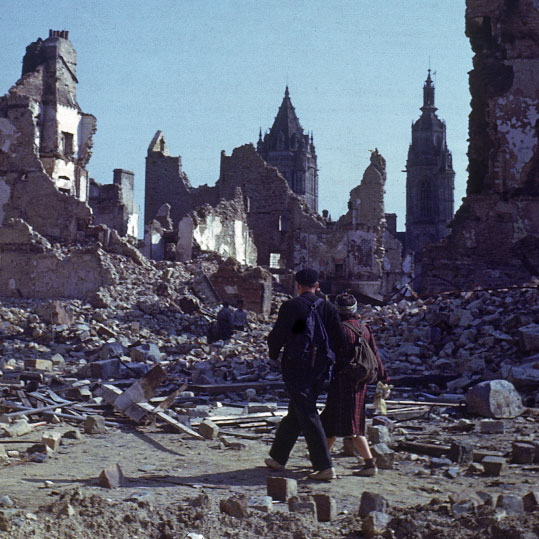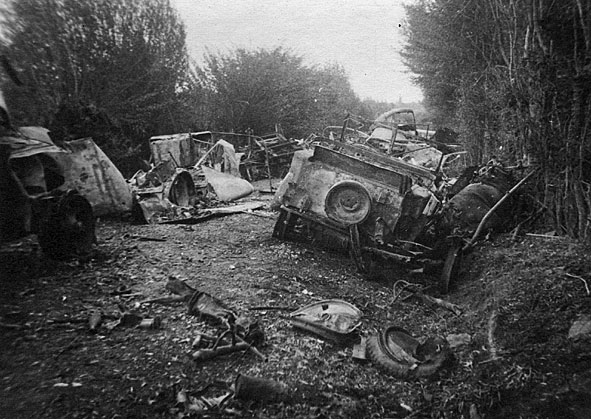Roland Fisher, born in 1926, was a soldier in the German Wehrmacht. He started out his military career in the "Arbeitsdienst" in 1943. He became a Wehrmacht soldier and was sent to Britanny and Normandy in 1944. After quite a few other relocations he ended back in Germany where he was captured by the American troops near Regensburg in 1945. Roland wrote a poem in 1951 about his memories of Normandy. Translation of the German poem in English is further down the page.
Symphonie des Todes
Es tobt in Frankreich die große Schlacht,
Soldaten sterben bei Tag und bei Nacht.
Über der Front erscheinen Bomber in Massen
Und viele müssen durch sie ihr Leben lassen.
Vor Caen und Saint Lô da trommelt der Tod,
Die Abende sind feurig, brennend und rot.
In Stahlgewittern brüllet auf die Welt
USA marschiert, doch Deutschland sich entgegenstellt.
Viel' Jabos stoßen vom blutig-blauen Himmel
In das durch Gräben, Gärten und Hecken hastende Gewimmel.
Feuer von oben, Schüsse von links und Panzer von vorn
Und manch' einer zielt das letzte Mal über Kimme und Korn.
Explosivgeschosse zischen morgens früh und abends spät,
Tote und Verwundete liegen oftmals wie gesät.
Aufgerissen sind dann Brust und Bein und Band,
Mancher muß verbluten und kann nicht zurück ins Heimatland.
Alte und junge Soldaten lachen nicht mehr,
Und in Brotbeutel und Feldflasche ist es schon lange leer.
Da essen sie unreife Äpfel und trinken Cider,
Einen halben, manchmal auch einen ganzen Liter.
Ein Bataillon marschiert durch Nacht und durch Not,
Doch ringsum in den Hecken lauert der amerikanische Tod.
Da bricht's hervor MGs hämmern, es krachen handgranaten,
Der Leutnant wird verwundet und viele meier Kameraden.
Ein Häuflein grauer Soldaten entkommt dem nächtlichen Streit.
Nun ziehn sie weiter, bedruckt von dem furchtbaren Leid.
Apathisch und schreckensbleich geht's über zerschossene Strippen,
Kein Lied, nur noch eine Frage auf blutenden Lippen.
Heimat, ach Heimat, wie bist du unendlich weit!
Sehn wir uns wieder ? Gibt's noch mal bessere Zeit ?
Hein, Brüder, faßt zum Kämpfen und Sterben Mut,
Im Dreck der Normandie, in Feuer und Blut!
In Cerisy auf dem Platz steht in grausiger Sommernacht
Als Fanal des Todes ein Leichenwagen auf Wacht.
Und unter Sterbenden flüstert's leis: Hergott, Vater du,
O hilf und gib uns allen die ewige Ruh!
Niedergewalzte Menschen, verbrannte und zerfetzte Leiber
Tot alle: Infanteristen, Nachrichtenleute und Kompanieschreiber.
Autowracks, gesprengte Panzer und herumliegendes Vieh
Tot alles: zerschossen Dörfer und die zerbombte Artillerie.
Graues Leiden und Sterben ... Kameraden, vergeßt es nicht!
In Stahl und Eisen ein blutiges Gericht.
Viele kehren nie mehr zurück in die Heimat, zu Liebchens Hand.
Mütter weinen in Deutschland, Amerika und auch in Engeland.
In Frankreich, in Frankreich o bittere Qual,
Viel' junge Herzen grüßen die Heimat zum letzten mal.
Das ist des Todes gewaltige und grausige Symphonie,
Im Sommer 44 in der Hölle der Normandie.
In Erinnerung an die Teilnahme der Schlacht in der Normandie - Juli 1944
Roland Fischer
Symphony of death
The great battle is raging in France
Soldiers die day and night.
Bombers appear en masse over the front
And many have to lose their lives through it.
Before Caen and Saint Lô the drums of death are played
The evenings are fiery, burning and red.
The world roars in steel storms
USA marches on, but Germany opposes.
Many warplanes come down from the bloody blue sky
Into the throng hurrying through ditches, gardens and hedges.
Fire from above, shots from the left and tanks from the front
And some people aim at the rear sight and front sight for the last time.
Explosive bullets hiss early in the morning and late in the evening,
Dead and wounded are often sown.
Then chest and leg and ligament are torn open,
Some have to bleed to death and cannot go back to their homeland.
Old and young soldiers don't laugh anymore
And the bread bag and canteen have long been empty.
They eat unripe apples and drink cider,
Half a liter, sometimes a whole liter.
A battalion marches through night and through adversity,
But American death lurks in the hedges all around.
Then it breaks out machine guns hammering, hand grenades crack
The lieutenant was wounded and so were many of my comrades.
A group of gray soldiers escaped the nocturnal argument.
Now they move on, oppressed by the terrible suffering.
Apathetically and terribly pale it goes over shot strings,
Not a song, just one more question on bleeding lips.
Home, oh home, how far are you!
Shall we see each other again? Is there ever a better time?
Hein, brothers, take courage to fight and die,
In the filth of Normandy, in fire and blood!
In Cerisy on the square it says a gruesome summer night
A hearse on watch as a beacon of death.
And among the dying there is a soft whisper: God, father you,
O help and give us all eternal rest!
People crushed, bodies burned and torn to shreds
All dead: infantrymen, newsmen and company clerks.
Wrecked cars, blown up tanks and cattle lying around
Dead everything: shot down villages and bombed artillery.
Gray suffering and dying comrades, do not forget it!
A bloody judgment in steel and iron.
Many never return home, to hold their sweetheart's hand.
Mothers cry in Germany, America and also in Engeland.
In France, in France o bitter torment,
Many young hearts greet home for the last time.
This is death's great and gruesome symphony,
In the summer of 44 in the hell of Normandy.
In memory of the participation in the Battle of Normandy - July 1944
by Roland Fischer
